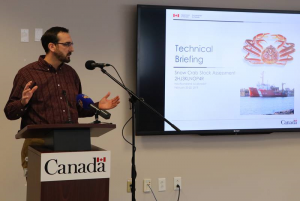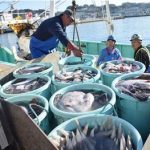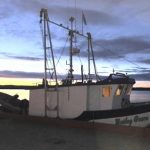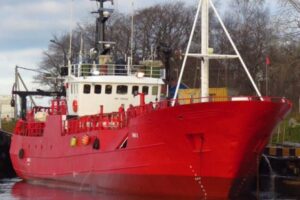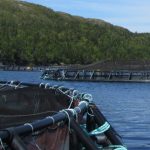Daily Archives: July 13, 2016
MPAs: Closing parts of the ocean to fishing not enough to protect marine ecosystems
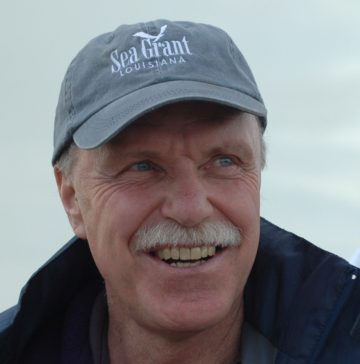 A University of Washington fisheries professor argues this week that saving biodiversity in the world’s oceans requires more than banning fishing with marine protected areas, or oceanic wilderness areas. In a three-page editorial published this week in the journal Nature, he argues that this increasingly popular conservation strategy is not as effective as properly managing recreational and commercial fisheries. “There’s this idea that the only way you can protect the ocean is by permanently closing parts of the ocean to fishing, with no-take areas,” said Ray Hilborn, a professor in the UW’s School of Aquatic and Fishery Sciences. “You protect biodiversity better by regulating fisheries over the country’s entire economic zone. Several environmental organizations have set a longer-term goal of making 30 percent of the world’s oceans into no-take marine protected areas by the year 2030. But Hilborn believes this is not the best way to protect global marine ecosystems. Read the rest here 20:48
A University of Washington fisheries professor argues this week that saving biodiversity in the world’s oceans requires more than banning fishing with marine protected areas, or oceanic wilderness areas. In a three-page editorial published this week in the journal Nature, he argues that this increasingly popular conservation strategy is not as effective as properly managing recreational and commercial fisheries. “There’s this idea that the only way you can protect the ocean is by permanently closing parts of the ocean to fishing, with no-take areas,” said Ray Hilborn, a professor in the UW’s School of Aquatic and Fishery Sciences. “You protect biodiversity better by regulating fisheries over the country’s entire economic zone. Several environmental organizations have set a longer-term goal of making 30 percent of the world’s oceans into no-take marine protected areas by the year 2030. But Hilborn believes this is not the best way to protect global marine ecosystems. Read the rest here 20:48
We Need Comprehensive Fisheries Legislation: The Fish Bill – Sam Parisi, Gloucester, Mass.
 I come from a long line of fishermen spanning three generations and although I am retired, I remain committed to the fishing industry, and will continue to do so, which is the reason I stay involved in politics. Back in the late 1970s I was appointed as chairman of The North Atlantic Task Force by than Governor Mike Dukakis. We brought the Canadians to Court for unfair exports of fresh fish into the USA ,we won the case. Back in the early 1960s before the 200 mile limit, I fished alongside Russian factory ships who raped our fisheries using small mesh nets. In 1977 we got relief when Senators Warren Magnuson and Gerry Studds penned the nations first fisheries management plan and ushered in the 200 mile limit. The Magnuson Act was the worlds first fisheries management plan that used biological targets to manage the fisheries. Read the essay here 18:30
I come from a long line of fishermen spanning three generations and although I am retired, I remain committed to the fishing industry, and will continue to do so, which is the reason I stay involved in politics. Back in the late 1970s I was appointed as chairman of The North Atlantic Task Force by than Governor Mike Dukakis. We brought the Canadians to Court for unfair exports of fresh fish into the USA ,we won the case. Back in the early 1960s before the 200 mile limit, I fished alongside Russian factory ships who raped our fisheries using small mesh nets. In 1977 we got relief when Senators Warren Magnuson and Gerry Studds penned the nations first fisheries management plan and ushered in the 200 mile limit. The Magnuson Act was the worlds first fisheries management plan that used biological targets to manage the fisheries. Read the essay here 18:30
Great Lakes commercial fishermen get hands-on experience in emergency procedures
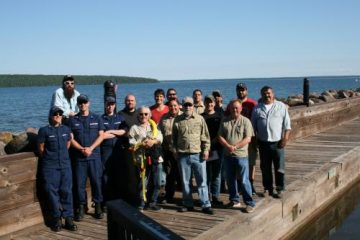 To assist with this effort Michigan Sea Grant coordinated six Drill Conductor Training courses held throughout the Great Lakes region recently to help Great Lakes commercial fishing vessel captains fulfill U.S. Coast Guard regulations related to instruction, drills and safety orientations, and onboard emergency instruction. Commercial fishers are required to practice monthly emergency drills that cover ten contingencies spelled out in the regulation. Persons conducting these drills must have passed a Drill Conductor Training course. The Alaska Marine Safety Education Association (AMSEA) assisted Michigan Sea Grant with these training efforts that were held in Michigan and Wisconsin. Read the rest here 16:54
To assist with this effort Michigan Sea Grant coordinated six Drill Conductor Training courses held throughout the Great Lakes region recently to help Great Lakes commercial fishing vessel captains fulfill U.S. Coast Guard regulations related to instruction, drills and safety orientations, and onboard emergency instruction. Commercial fishers are required to practice monthly emergency drills that cover ten contingencies spelled out in the regulation. Persons conducting these drills must have passed a Drill Conductor Training course. The Alaska Marine Safety Education Association (AMSEA) assisted Michigan Sea Grant with these training efforts that were held in Michigan and Wisconsin. Read the rest here 16:54
Another Fishery, Another Threat – LI commercial bluefish season faces unprecedented mid season closure
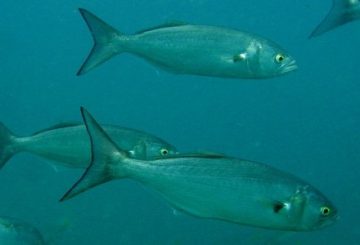 Locally caught bluefish fillets may soon be scarce at Long Island fish stores if actions by the federal government force a closure of the New York commercial fishery in coming days. In a letter to the regional director of the National Oceanic and Atmospheric Administration Tuesday, the commissioner of the state Department of Environmental Conservation said newly implemented restrictions on commercial bluefish harvesting would have “devastating” impacts. “I urge you to reconsider the management strategy for Atlantic bluefish,” BDEC Commissioner Basil Seggos wrote to NOAA regional director . “The elimination in mid season of quota from the commercial fishery in 2016 is shocking and would deal a devastating blow to our commercial fisheries.” Read the rest here 16:10
Locally caught bluefish fillets may soon be scarce at Long Island fish stores if actions by the federal government force a closure of the New York commercial fishery in coming days. In a letter to the regional director of the National Oceanic and Atmospheric Administration Tuesday, the commissioner of the state Department of Environmental Conservation said newly implemented restrictions on commercial bluefish harvesting would have “devastating” impacts. “I urge you to reconsider the management strategy for Atlantic bluefish,” BDEC Commissioner Basil Seggos wrote to NOAA regional director . “The elimination in mid season of quota from the commercial fishery in 2016 is shocking and would deal a devastating blow to our commercial fisheries.” Read the rest here 16:10
‘Wicked Tuna’ premier party set for July 23 at Pirate’s Cove Pavilion
 “Wicked Tuna: Outer Banks,” the third season of the National Geographic TV channel series featuring North Carolina fishermen, will have a local premier party on Saturday, July 23 at Pirate’s Cove Pavilion. The event will be a fundraiser for North Carolina Watermen United and the North Carolina Watermen Foundation. The party will feature dinner by Ortega’z Southwestern Grill, a cash bar with beer and wine, and a Q&A with all three participating southern captains, as well as the screening of the 2015 final episode and the 2016 first episode. The captains — Greg Mayer, 2014 and 2015 winner of ; returning three year veteran Britt Shackelford; and two year veteran Charlie Griffin — will be on-hand to talk about the experience, sign autographs and shake hands. Some of their mates will be there as well. The captains will have their boats at the marina, weather permitting. On the heels of its fifth season of the hit series Wicked Tuna, National Geographic Channel once again pits the finest captains in Gloucester, Mass. against the best southern fishermen in the third season of the spinoff series Wicked Tuna: Outer Banks, premiering Monday, July 25 at 9 p.m. Read the rest here 14:09
“Wicked Tuna: Outer Banks,” the third season of the National Geographic TV channel series featuring North Carolina fishermen, will have a local premier party on Saturday, July 23 at Pirate’s Cove Pavilion. The event will be a fundraiser for North Carolina Watermen United and the North Carolina Watermen Foundation. The party will feature dinner by Ortega’z Southwestern Grill, a cash bar with beer and wine, and a Q&A with all three participating southern captains, as well as the screening of the 2015 final episode and the 2016 first episode. The captains — Greg Mayer, 2014 and 2015 winner of ; returning three year veteran Britt Shackelford; and two year veteran Charlie Griffin — will be on-hand to talk about the experience, sign autographs and shake hands. Some of their mates will be there as well. The captains will have their boats at the marina, weather permitting. On the heels of its fifth season of the hit series Wicked Tuna, National Geographic Channel once again pits the finest captains in Gloucester, Mass. against the best southern fishermen in the third season of the spinoff series Wicked Tuna: Outer Banks, premiering Monday, July 25 at 9 p.m. Read the rest here 14:09
Exactly where do Maine lobstermen fish?! The government wants to know
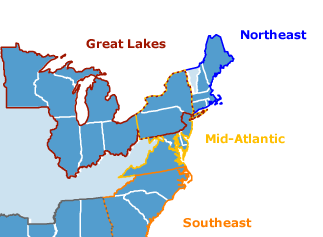 It is the state’s largest fishery, bringing in more than $500 million a year and employing tens of thousands of people up and down the supply chain, but there is no map that shows exactly where Maine’s lobstermen trap their catch. Most of them fish within 3 miles of the coast, and thus do not fill out detailed federal catch reports or have onboard satellite tracking systems that lend themselves to detailed maps of valuable fishing territories. That suits many lobstermen just fine, because they say their territory changes from year to year and they don’t like the notion of the government tracking where they fish. But that attitude makes life difficult for regulatory agencies responsible for permitting non-fishing activities in the Gulf of Maine, such as wind farms or mining operations. The lack of detailed, up-to-date maps of lobster fishing grounds is obvious when reviewing the hundreds of maps collected by the Northeast Regional Planning Body, the federal planning body that is overseeing the nation’s regional ocean planning from the Gulf of Maine to Long Island Sound. The council is building a trove of online data,,, Read the rest here 12:35
It is the state’s largest fishery, bringing in more than $500 million a year and employing tens of thousands of people up and down the supply chain, but there is no map that shows exactly where Maine’s lobstermen trap their catch. Most of them fish within 3 miles of the coast, and thus do not fill out detailed federal catch reports or have onboard satellite tracking systems that lend themselves to detailed maps of valuable fishing territories. That suits many lobstermen just fine, because they say their territory changes from year to year and they don’t like the notion of the government tracking where they fish. But that attitude makes life difficult for regulatory agencies responsible for permitting non-fishing activities in the Gulf of Maine, such as wind farms or mining operations. The lack of detailed, up-to-date maps of lobster fishing grounds is obvious when reviewing the hundreds of maps collected by the Northeast Regional Planning Body, the federal planning body that is overseeing the nation’s regional ocean planning from the Gulf of Maine to Long Island Sound. The council is building a trove of online data,,, Read the rest here 12:35
Athearn Marine Agency Boat of the Week: 45′ Guimond Tuna/Lobster/Charter, Twin Cummins Diesels
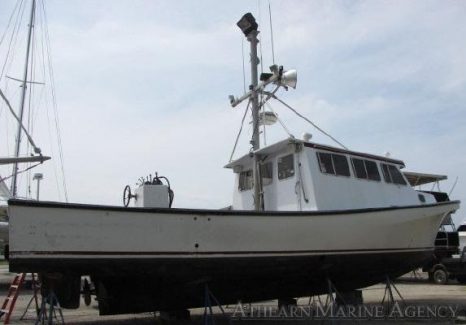 Specifications, information and 15 photo’s click here To see all the boats in this series, Click here 12:19
Specifications, information and 15 photo’s click here To see all the boats in this series, Click here 12:19
Floating turbine system to be tested in Bay of Fundy, The Holy Grail
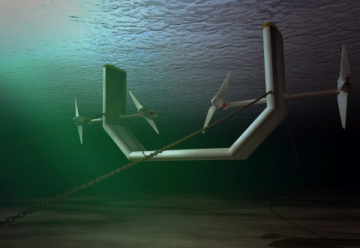 A Dutch firm that calls the Bay of Fundy “the holy grail” aims to exploit the bay’s powerful tidal currents by testing a floating turbine system starting next year. Halifax-based Minas Energy announced Tuesday it was partnering with Dutch firm Tocardo International BV and Ontario-based International Marine Energy Inc. to form the Minas Tidal Limited Partnership. The new partnership plans to test the Dutch company’s technology in the Minas Passage by late 2017, the third distinct approach announced recently to harnessing the bay’s powerful forces. “We feel brave enough to go to the Bay of Fundy,” said Van Breugel. “The Bay of Fundy is the holy grail.” Read the rest here 11:49
A Dutch firm that calls the Bay of Fundy “the holy grail” aims to exploit the bay’s powerful tidal currents by testing a floating turbine system starting next year. Halifax-based Minas Energy announced Tuesday it was partnering with Dutch firm Tocardo International BV and Ontario-based International Marine Energy Inc. to form the Minas Tidal Limited Partnership. The new partnership plans to test the Dutch company’s technology in the Minas Passage by late 2017, the third distinct approach announced recently to harnessing the bay’s powerful forces. “We feel brave enough to go to the Bay of Fundy,” said Van Breugel. “The Bay of Fundy is the holy grail.” Read the rest here 11:49
California Fishermen’s Fight for Otter-Free Zone Advances
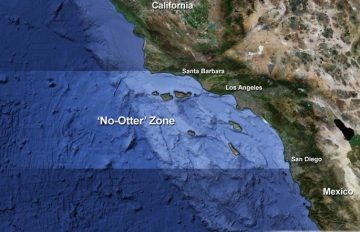 Fishing industry groups fighting for a “no-otter” zone along the southern coast of California can advance their claims, the Ninth Circuit Court of Appeals ruled on Tuesday, reversing a district court decision to dismiss the case. The Ninth Circuit’s ruling found that four fishing industry groups’ 2013 challenge to the U.S. Fish and Wildlife Service’s authority to end a sea otter translocation program was not barred by the statute of limitations. The Ninth Circuit did not rule on the merits of the case, instead asserting that the case should not have been dismissed from federal court on the timeliness issue. “The operative agency action challenged is the 2012 program termination, and thus that plaintiffs’ challenge is timely,” U.S. Circuit Judge Ronald Gould wrote for the three-judge panel. “We express no opinion on the merits of plaintiffs’ underlying claims.” The underlying dispute stems from a long and fractious battle between environmentalists advocating on behalf of sea otters and fishing industry groups claiming that allowing the mammals unfettered access to coastal areas would compromise or even destroy shellfish fisheries along California’s southern coast. Read the rest here 10:36
Fishing industry groups fighting for a “no-otter” zone along the southern coast of California can advance their claims, the Ninth Circuit Court of Appeals ruled on Tuesday, reversing a district court decision to dismiss the case. The Ninth Circuit’s ruling found that four fishing industry groups’ 2013 challenge to the U.S. Fish and Wildlife Service’s authority to end a sea otter translocation program was not barred by the statute of limitations. The Ninth Circuit did not rule on the merits of the case, instead asserting that the case should not have been dismissed from federal court on the timeliness issue. “The operative agency action challenged is the 2012 program termination, and thus that plaintiffs’ challenge is timely,” U.S. Circuit Judge Ronald Gould wrote for the three-judge panel. “We express no opinion on the merits of plaintiffs’ underlying claims.” The underlying dispute stems from a long and fractious battle between environmentalists advocating on behalf of sea otters and fishing industry groups claiming that allowing the mammals unfettered access to coastal areas would compromise or even destroy shellfish fisheries along California’s southern coast. Read the rest here 10:36
Coast Guard completes F/V Orin C investigation – Draft report of rescue under review
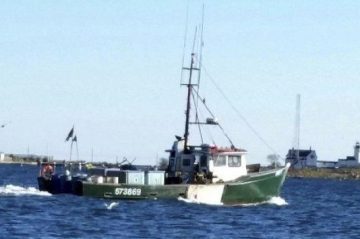 The U.S. Coast Guard is getting closer to finalizing its casualty investigation into December’s sinking of the Orin C and the drowning death of owner and Captain David “Heavy D” Sutherland during the rescue attempt that saved two crew members. A draft of the Coast Guard’s internal investigation has been completed at the Coast Guard’s District 1 Headquarters in Boston and now is under review at Coast Guard headquarters in Washington D.C., according to Lt. Karen Kutkiewicz, a public affairs officer for the service. “I have no definite timeline on when (the Coast Guard) will publish the final findings, nor where they are in the review process,” Kutkiewicz said in an email response to the Gloucester Daily Times. “The findings will be made public once finalized by Coast Guard headquarters.” The National Transportation Safety Board also is investigating the sinking of the Orin C on Dec. 3, 2015, about 12 miles off Thacher Island. The incapacitated 51-foot slime-eel fishing boat was being towed back to Gloucester Harbor through worsening seas, first by a Good Samaritan fisherman and later by the Coast Guard. Read the rest here 09:46
The U.S. Coast Guard is getting closer to finalizing its casualty investigation into December’s sinking of the Orin C and the drowning death of owner and Captain David “Heavy D” Sutherland during the rescue attempt that saved two crew members. A draft of the Coast Guard’s internal investigation has been completed at the Coast Guard’s District 1 Headquarters in Boston and now is under review at Coast Guard headquarters in Washington D.C., according to Lt. Karen Kutkiewicz, a public affairs officer for the service. “I have no definite timeline on when (the Coast Guard) will publish the final findings, nor where they are in the review process,” Kutkiewicz said in an email response to the Gloucester Daily Times. “The findings will be made public once finalized by Coast Guard headquarters.” The National Transportation Safety Board also is investigating the sinking of the Orin C on Dec. 3, 2015, about 12 miles off Thacher Island. The incapacitated 51-foot slime-eel fishing boat was being towed back to Gloucester Harbor through worsening seas, first by a Good Samaritan fisherman and later by the Coast Guard. Read the rest here 09:46
Vancouver Island Skipper fined $10,000 for unknowingly violating fishery laws
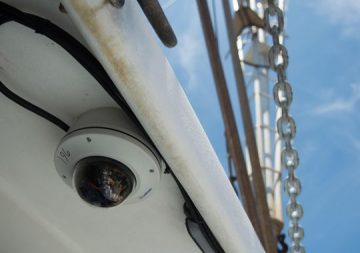 A north Island fishing boat captain was fined $10,000 last week for Fisheries Act infractions that may have actually cost him money, and the judge accepts he had no idea he made. Following court hearings before Judge Catherine Crockett in Campbell River and Courtenay Provincial Court, Ian Jeffrey Garnier, 45, was fined July 8 for fishing in a closed area, failing to properly record his catch, and releasing fish contrary to regulations, among other Fisheries Act charges. “Given the extensive monitoring by on-board observers or electronic means, it is difficult to conceive of why a person would deliberately violate any of the conditions that form the bases of these charges,” Crockett wrote in her decision. “It was only a matter of time before the violations were discovered.” In the first instance, video cameras in place to ensure license compliance recorded members of Garnier’s crew tossing about 2,000 pounds of fish overboard without his knowledge — fish they could have kept. Neither he, nor the crew could provide any reason for the action, which the court described as throwing money away. In the second instance, Read the rest here 09:00
A north Island fishing boat captain was fined $10,000 last week for Fisheries Act infractions that may have actually cost him money, and the judge accepts he had no idea he made. Following court hearings before Judge Catherine Crockett in Campbell River and Courtenay Provincial Court, Ian Jeffrey Garnier, 45, was fined July 8 for fishing in a closed area, failing to properly record his catch, and releasing fish contrary to regulations, among other Fisheries Act charges. “Given the extensive monitoring by on-board observers or electronic means, it is difficult to conceive of why a person would deliberately violate any of the conditions that form the bases of these charges,” Crockett wrote in her decision. “It was only a matter of time before the violations were discovered.” In the first instance, video cameras in place to ensure license compliance recorded members of Garnier’s crew tossing about 2,000 pounds of fish overboard without his knowledge — fish they could have kept. Neither he, nor the crew could provide any reason for the action, which the court described as throwing money away. In the second instance, Read the rest here 09:00
WWF Australia buys $100,000 shark net licence to stop it ending up in hands of fishers
 Conservation group WWF Australia has bought a commercial shark fishing licence in an unusual move to protect the predators in the Great Barrier Reef Marine Park and beyond. Conservation director Gilly Llewellyn said the licence cost $100,000, which includes a 1.2 kilometre net. “We’re going to take it out of the water and make sure it doesn’t go fishing,” she said. “This is a shot across the bow to the management authorities and to the Australian Government that we believe they should be protected,” she said. The WWF’s fishing licence has not been used since 2004, prompting questions about whether the move will make a difference. However, Ms Llewellyn said it was a worthwhile purchase. WWF Australia is hoping donations will pay for the net fishing licence. Read the story here 08:06
Conservation group WWF Australia has bought a commercial shark fishing licence in an unusual move to protect the predators in the Great Barrier Reef Marine Park and beyond. Conservation director Gilly Llewellyn said the licence cost $100,000, which includes a 1.2 kilometre net. “We’re going to take it out of the water and make sure it doesn’t go fishing,” she said. “This is a shot across the bow to the management authorities and to the Australian Government that we believe they should be protected,” she said. The WWF’s fishing licence has not been used since 2004, prompting questions about whether the move will make a difference. However, Ms Llewellyn said it was a worthwhile purchase. WWF Australia is hoping donations will pay for the net fishing licence. Read the story here 08:06


































